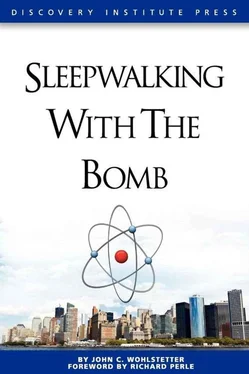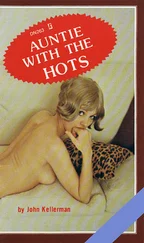John Wohlstetter - Sleepwalking with the Bomb
Здесь есть возможность читать онлайн «John Wohlstetter - Sleepwalking with the Bomb» весь текст электронной книги совершенно бесплатно (целиком полную версию без сокращений). В некоторых случаях можно слушать аудио, скачать через торрент в формате fb2 и присутствует краткое содержание. Город: Seattle, Год выпуска: 2012, ISBN: 2012, Издательство: Discovery Institute Press, Жанр: История, military, Политика, Публицистика, на английском языке. Описание произведения, (предисловие) а так же отзывы посетителей доступны на портале библиотеки ЛибКат.
- Название:Sleepwalking with the Bomb
- Автор:
- Издательство:Discovery Institute Press
- Жанр:
- Год:2012
- Город:Seattle
- ISBN:978-1-93659-906-6
- Рейтинг книги:3 / 5. Голосов: 1
-
Избранное:Добавить в избранное
- Отзывы:
-
Ваша оценка:
- 60
- 1
- 2
- 3
- 4
- 5
Sleepwalking with the Bomb: краткое содержание, описание и аннотация
Предлагаем к чтению аннотацию, описание, краткое содержание или предисловие (зависит от того, что написал сам автор книги «Sleepwalking with the Bomb»). Если вы не нашли необходимую информацию о книге — напишите в комментариях, мы постараемся отыскать её.
RICHARD PERLE, Resident Fellow, American Enterprise Institute and Assistant Secretary of Defense, 1981–1987 Sleepwalking with the Bomb
Sleepwalking with the Bomb — читать онлайн бесплатно полную книгу (весь текст) целиком
Ниже представлен текст книги, разбитый по страницам. Система сохранения места последней прочитанной страницы, позволяет с удобством читать онлайн бесплатно книгу «Sleepwalking with the Bomb», без необходимости каждый раз заново искать на чём Вы остановились. Поставьте закладку, и сможете в любой момент перейти на страницу, на которой закончили чтение.
Интервал:
Закладка:
But the lay public was not getting its information about nuclear weapons and strategy from Wohlstetter or Kahn. They were reading various popular nuclear-war-themed books, at least five of which were written in the six years from Sputnik to the Cuban Missile Crisis. These include Peter Bryant’s 1958 novel, Red Alert , the source material for the acclaimed 1964 Stanley Kubrick black comedy Dr. Strangelove, or How I Stopped Worrying and Learned to Love the Bomb. [3] Appendix 1 discusses how novels distorted public perceptions of nuclear risks.
However, amid the exaggerations of popular fiction, some fictional assertions were close to the truth. The cliché that pushing one button could start a war by launching strategic weapons was true of the Soviet Union at the time of Strangelove . That soon changed. After the Cuban Missile Crisis, the Soviet leadership made intensive efforts to reduce the risk of accidental war, and, starting in 1967 a series of upgrades were put into place. The U.S. had strict controls on arming most nuclear weapons from the start. [4] Appendix 2 discusses the evolution of command and control over nuclear weapons.
Strangelove features a secret Russian “doomsday device” that, upon a U.S. attack, automatically triggers an all-out Russian nuclear counter-strike. No such automatic system existed. However, two decades later, the Soviets built a semiautomatic system, known as “Dead Hand,” in which a small cadre of duty officers, sheltered in a deep underground bunker, could decide to launch an all-out retaliatory strike. Dead Hand was tested late in 1984 and activated January 1, 1985.
Kennedy, Khrushchev, and Berlin: Nuclear Blackmail Succeeds
DECADES BEFORE Dead Hand (and years before Strangelove ) the Kennedy administration thought the Dulles policy—of all-out nuclear response to any kind of Soviet attack—unrealistic, and sought a more credible deterrent. “Flexible response” became the order of the day: the options ranged from conventional forces only to battlefield nuclear use to strategic nuclear use. Instead of making a threat of all-out war that might well not be believed, flexible response enabled the U.S. to decide what level of force would be needed on a case-by-case basis.
The Western powers had agreed never to launch a nuclear “first strike” but retained the option of “first use” of nuclear weapons given a conflict already under way. That was essential to prevent the Soviets from overrunning Western Europe by sheer weight of numbers. As Winston Churchill put it in 1948:
Nothing stands between Europe today and complete subjugation to Communist tyranny but the atomic bomb in American possession…. What do you suppose would be the position this afternoon if it had been Communist Russia instead of free enterprise America which had created the atomic weapon? Instead of being a somber guarantee of peace and freedom it would have become an irresistible method of human enslavement.
Proof of this was provided in 1948, at the outset of the Berlin Airlift. President Truman let word leak that U.S. bombers capable of carrying A-bombs were deployed to Britain. Duly warned, Stalin dared not shoot down Allied planes dropping supplies to Berliners.
The first test of the Kennedy administration’s resolve came right away. In April of 1961 the infamous “Bay of Pigs” invasion of Cuba was easily crushed by the forces of the charismatic revolutionary Fidel Castro. At a crucial moment during the operation, Kennedy lost his nerve and abandoned the Cuban exiles that had landed on the beach. They were slaughtered or imprisoned by Castro’s forces.
Only six weeks after this embarrassing failure in Cuba came another test, a summit in Vienna with Soviet premier Nikita Khrushchev to discuss divided Berlin. U.S. intelligence described the Soviet premier as a “chronic, optimistic opportunist” with “resourcefulness, audacity, a good sense of political timing and showmanship, and a touch of the gambler’s instinct.” Khrushchev had survived Stalin’s purges in the late 1930s and the power struggle after Stalin died; he denounced Stalin in his landmark 1956 “Secret Speech” and consolidated his grip on power. The summit was to have fateful consequences.
Author Frederick Kempe, in his magisterial Berlin 1961 , recounts how nuclear risks played a crucial role in the Berlin Crisis, from run-up to conclusion and thereafter.
At 2 a.m. on the first day of 1960, late into a Kremlin New Year’s Eve party, Khrushchev had cut loose with a drunken tirade in which he threatened to start World War III if he did not get his way on Berlin, scaring the wits out of U.S. ambassador Llewellyn Thompson. Khrushchev boasted that he had 30 nuclear weapons aimed at France, and 50 each aimed at West Germany and Britain, plus a “secret” number targeting the United States. Six hydrogen bombs could destroy Britain, Khrushchev told the British ambassador six months later, and nine could destroy France. “Berlin,” said the notoriously earthy Khrushchev on an equally diplomatic visit to West Germany, “is the testicles of the West. Each time I give them a yank, they holler.”
At that point, East Germans were crossing the border into West Berlin—and on into West Germany—by the thousands daily, and the Soviets wanted to seal off this access. West Berlin, 200 miles inside East Germany and connected to the rest of West Germany by only a single highway, would be easy to blockade. That the Potsdam Treaty guaranteed the four occupying powers—the U.S., Great Britain, France, and the Soviet Union—full right of access to the whole city mattered little to Khrushchev or to the East German dictator, Walter Ulbricht, who was seeing his country’s population shrinking daily.
West German chancellor Konrad Adenauer and French president Charles de Gaulle wanted Kennedy to guarantee that if necessary to stop a Russian takeover of Berlin, the U.S. would escalate to nuclear war. But Kennedy told de Gaulle he understood why France sought an independent nuclear force—the French leader had earlier said that he did not believe the U.S. would sacrifice New York for Paris or Berlin. Former secretary of state Dean Acheson, a close adviser of Kennedy’s, was convinced that a U.S. threat to use nuclear weapons against the Soviets over the status of Berlin might not suffice to deter Khrushchev. Famed columnist Walter Lippmann interviewed Khrushchev before the Vienna summit. “[T]here are no such stupid statesmen in the West to unleash a war in which hundreds of millions would perish” over the status of Berlin, the Soviet premier told the columnist. “Such idiots have not yet been born.”
On June 1, two days before the meeting in Vienna, Kennedy had told his aides it was “silly for us to be facing an atomic war over a treaty preserving Berlin as the future capital of a reunified Germany when all of us know that Germany will probably never be reunified. But we’re committed to that agreement, and so are the Russians, so we can’t let them back out of it.” During the summit, Kennedy raised the prospect of miscalculation leading to nuclear war, but the Soviet dictator brushed it aside contemptuously: “All I ever hear… is that damned word ‘miscalculation!’… [W]e will not start a war by mistake…. You ought to take that word ‘miscalculation’ and bury it in cold storage and never use it again.”
Khrushchev threatened war if he did not get his way, and convincingly suggested his indifference to the devastating toll a nuclear exchange would take. Kennedy yielded, allowing Khrushchev to treat East Berlin as if it were Soviet territory. The result, beginning on the night of August 13, 1961, was the sudden, swift erection of the Berlin Wall, which virtually shut down cross-border traffic. The Soviets’ plan, at least as understood by Bobby Kennedy, the president’s brother and attorney general, was to “break our will in Berlin [so] that we will never be good for anything else and they will have won the battle in 1961…. Their plan is… to terrorize the world into submission.”
Читать дальшеИнтервал:
Закладка:
Похожие книги на «Sleepwalking with the Bomb»
Представляем Вашему вниманию похожие книги на «Sleepwalking with the Bomb» списком для выбора. Мы отобрали схожую по названию и смыслу литературу в надежде предоставить читателям больше вариантов отыскать новые, интересные, ещё непрочитанные произведения.
Обсуждение, отзывы о книге «Sleepwalking with the Bomb» и просто собственные мнения читателей. Оставьте ваши комментарии, напишите, что Вы думаете о произведении, его смысле или главных героях. Укажите что конкретно понравилось, а что нет, и почему Вы так считаете.












